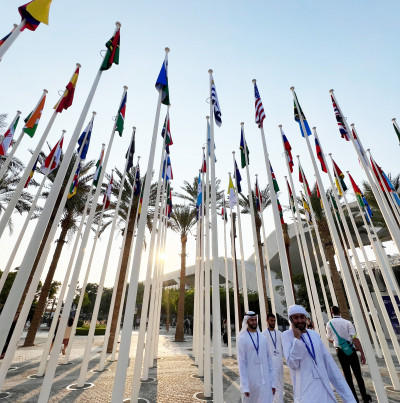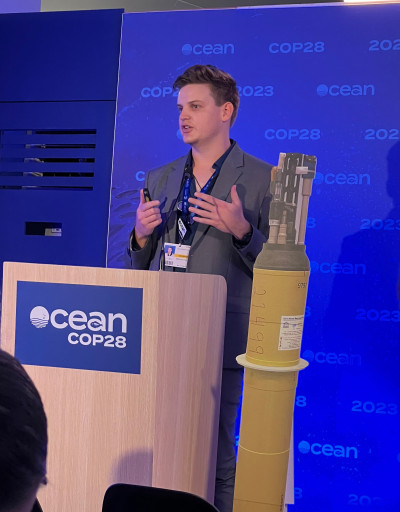There had been a lot of well-deserved consternation around the United Arab Emirates, one of the world's top oil producing nations, hosting COP28, a global conference with stated intentions to limit global warming and enable climate change adaptation. But after experiencing COP28 myself, it felt strangely appropriate that it was hosted in a land of excess and grandeur.

COP28 — formally the 28th meeting of the Conference of the Parties to the United Nations Framework Convention on Climate Change — was a massive event with over 70,000 attendees, including a record number of more than 2,400 fossil fuel lobbyists. The sheer size of the event made it both a confusing and insightful experience. There was always something happening, whether that be negotiations, side events, press conferences, panels, or, most commonly, all of the above all at the same time. It was like having multiple conferences rolled into one.
I attended COP28 as part of the University of California observer organization, which included a group of students and faculty from UC San Diego's Scripps Institution of Oceanography. Our Scripps delegation was based at the Ocean Pavilion, organized by Scripps Institution of Oceanography and Woods Hole Oceanographic Institution with support from 32 other international partners. The goal of the pavilion was to represent the importance of the ocean and the role that ocean science needs to play in providing climate solutions.
Events at the pavilion included panels featuring speakers such as Rick Spinrad, Administrator of NOAA and Under Secretary of Commerce for Oceans and Atmosphere; Michael Morgan, Assistant Secretary of Commerce for Environmental Observation and Prediction; U.S. Senators Sheldon Whitehouse (Rhode Island) and Ben Cardin (Maryland); and myself.
I was on an Ocean Pavilion panel led by Scripps' own physical oceanographer Lynne Talley that discussed the importance of long-term ocean observing systems such as Argo and GO-SHIP in measuring the changing global ocean. Other members of the Scripps delegation also participated in Ocean Pavilion panels, and recordings of all the panels have been archived on the Ocean Pavilion's YouTube channel.

Of course, the negotiations are the most important part of COP and the reason such a crazy event is necessary in the first place. For any agreement — think along the lines of the Paris Agreement — to be passed at COP, a global consensus must be reached on every single word included in the text. I can't imagine how a truly global consensus could even begin to be achieved without having representatives from countries all around the world present in a single room. The negotiation process is frustratingly slow, but without agreement from everyone — especially top oil-producing countries such as the United States and United Arab Emirates — even the best plans to limit global warming to 1.5°C (2.7°F) above pre-industrial levels will fail.
Perhaps reflecting the immense difficulty in reaching a global agreement, COP28 extended beyond its scheduled Dec. 12 end date. A last-minute agreement was passed the next day. In a concerning twist, the Alliance of Small Island States (AOSIS) was still discussing the proposed text and thus not even present in the room when the agreement was passed. Given that AOSIS represents 39 countries, I do not know how this agreement (ironically referred to as The UAE Consensus) can be considered a global consensus. These AOSIS countries are some of the most vulnerable to the impacts of climate change, including rising sea levels and more intense tropical storms. Similar impacts are also being felt in my home country of New Zealand, a substantially larger island nation, and I am devastated for the people who call these small island states home.
But alongside the genuine pain and tears I shed for my Pasifika friends and whānau, there were some smaller victories achieved at COP28. One such victory was the establishment of the Loss and Damage Fund designed to compensate poorer countries suffering the adverse impacts of climate change. The fund has since received small initial contributions from a few countries.
Ultimately the commitments made at COP28 seem unlikely to be enough to hold global warming to less than 1.5°C. We need to do more as a collective global community. We need a fast, fair, funded, and full phase-out of fossil fuels.
Mitchell Chandler is a Fulbright New Zealand grantee and fifth-year PhD candidate at Scripps Institution of Oceanography where he uses Argo observations to study large-scale ocean currents in both the upper-ocean and deep-ocean. You can find Mitchell on LinkedIn and on X/Twitter.
About Scripps Oceanography
Scripps Institution of Oceanography at the University of California San Diego is one of the world’s most important centers for global earth science research and education. In its second century of discovery, Scripps scientists work to understand and protect the planet, and investigate our oceans, Earth, and atmosphere to find solutions to our greatest environmental challenges. Scripps offers unparalleled education and training for the next generation of scientific and environmental leaders through its undergraduate, master’s and doctoral programs. The institution also operates a fleet of four oceanographic research vessels, and is home to Birch Aquarium at Scripps, the public exploration center that welcomes 500,000 visitors each year.
About UC San Diego
At the University of California San Diego, we embrace a culture of exploration and experimentation. Established in 1960, UC San Diego has been shaped by exceptional scholars who aren’t afraid to look deeper, challenge expectations and redefine conventional wisdom. As one of the top 15 research universities in the world, we are driving innovation and change to advance society, propel economic growth and make our world a better place. Learn more at ucsd.edu.



